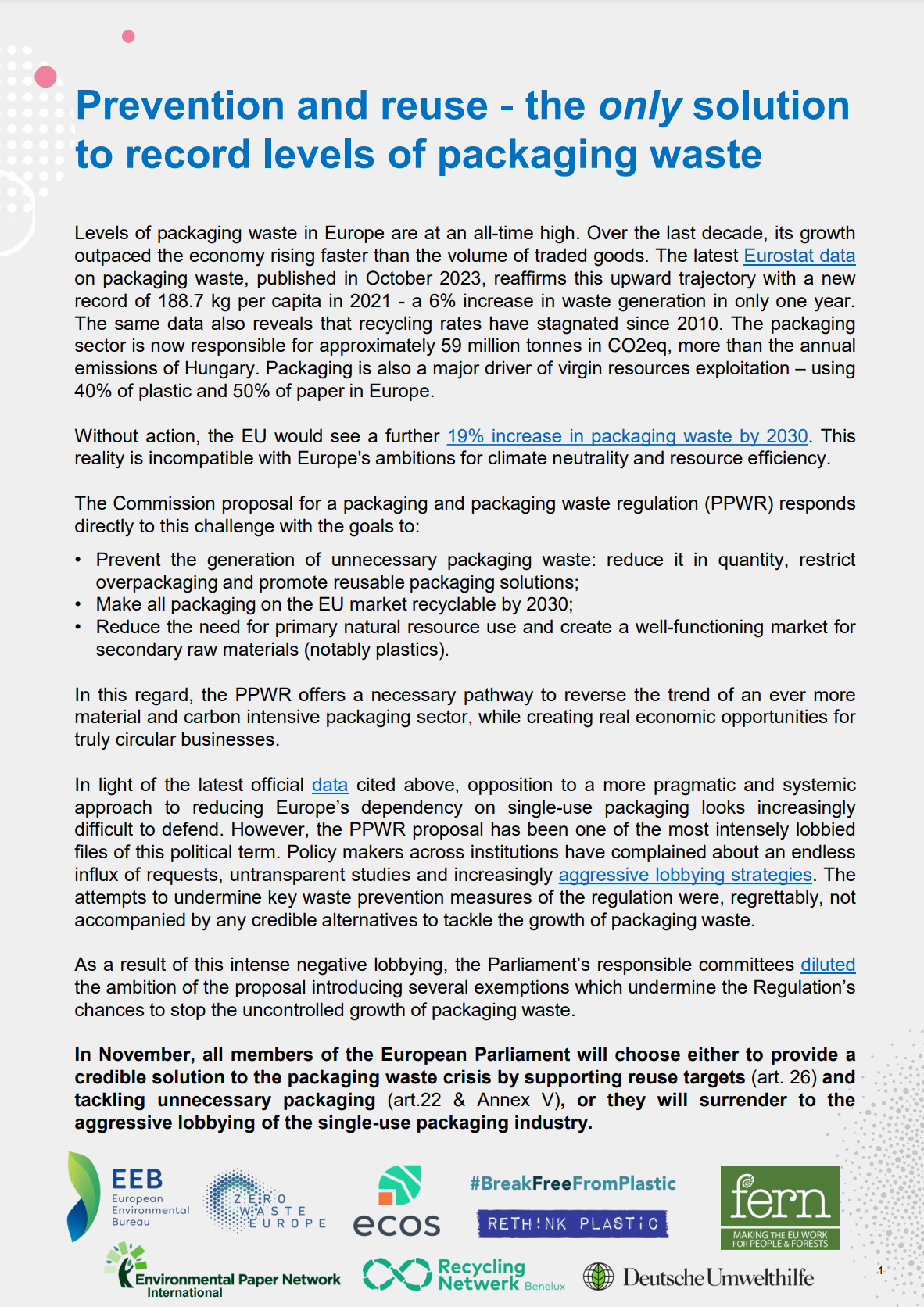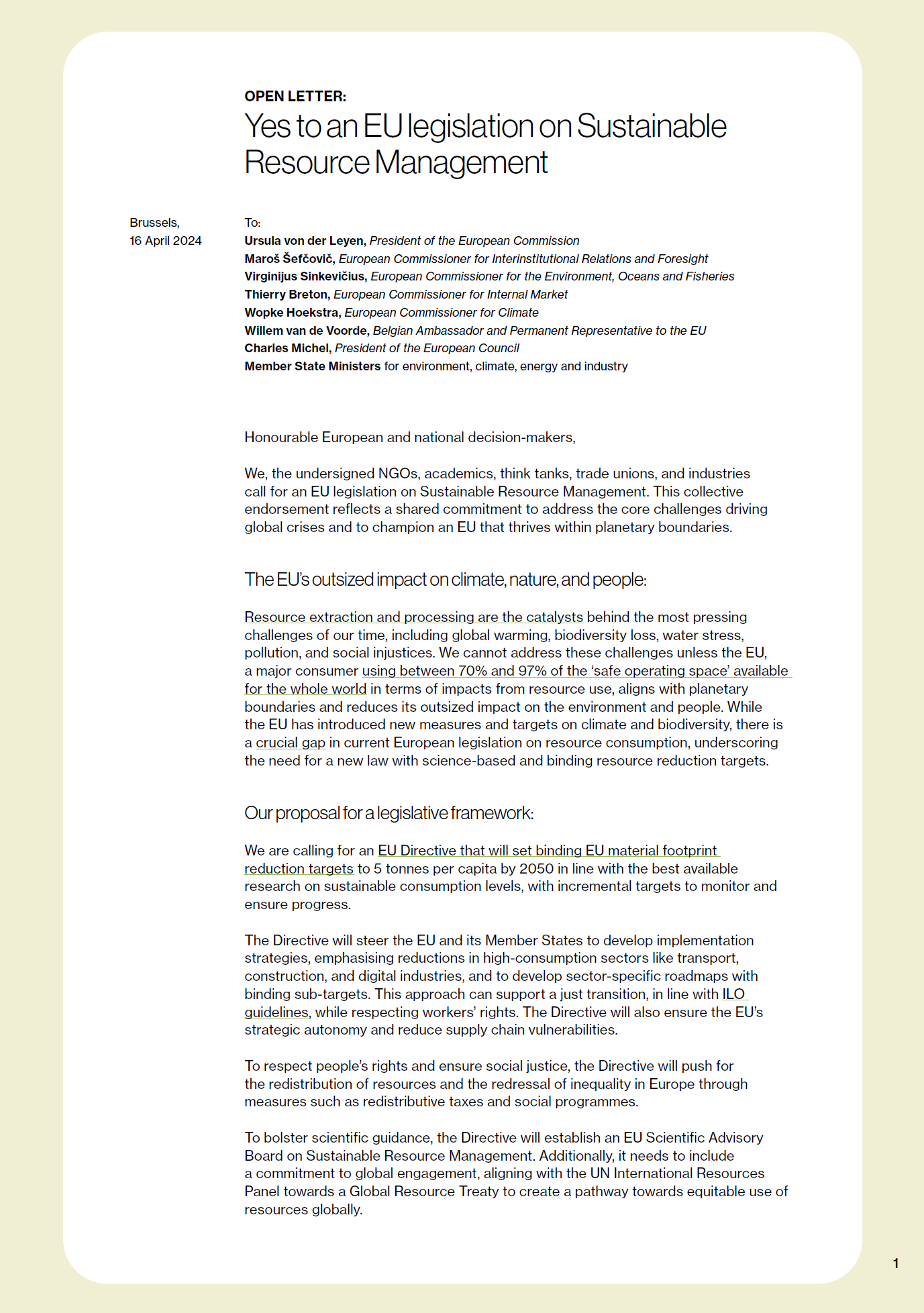
Zero Waste Europe joined over 100 organisations in an open letter calling for EU legislation on Sustainable Resource Management. Signed by various NGOs, academics, think tanks, trade unions, and industries, this letter advocates that legislation on Sustainable Resource Management is crucial to address the challenges of global crises, and to ensure that the EU economy operates within planetary boundaries.
Available in English.
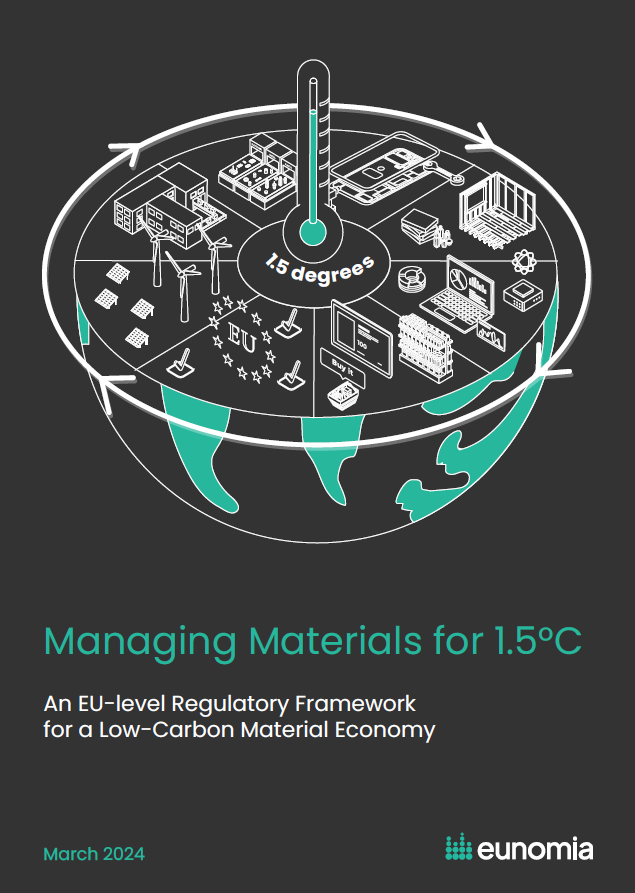
Now is the time to build an effective EU policy framework for managing materials – one that will accelerate Europe’s transition to a circular economy, support a strong industrial strategy, and make it easier to do business in Europe.
This joint report by Eunomia Research & Consulting, Handelens Miljøford, Minderoo Foundation, TOMRA, and Zero Waste Europe sets out the components of a regulatory framework that will:
– Harness the power of the Single Market and sustain its unity, enabling a fair and competitive system for all: business, industry, and consumers.
– Minimise administrative burdens for businesses operating in the EU.
– Support a fit-for-the-future industrial strategy that keeps Europe internationally competitive.
– Safeguard the bloc’s material security amid geopolitical uncertainties and price volatility.
– Consolidate Europe’s global leadership in circular economy and digital product policy.
Available in English.
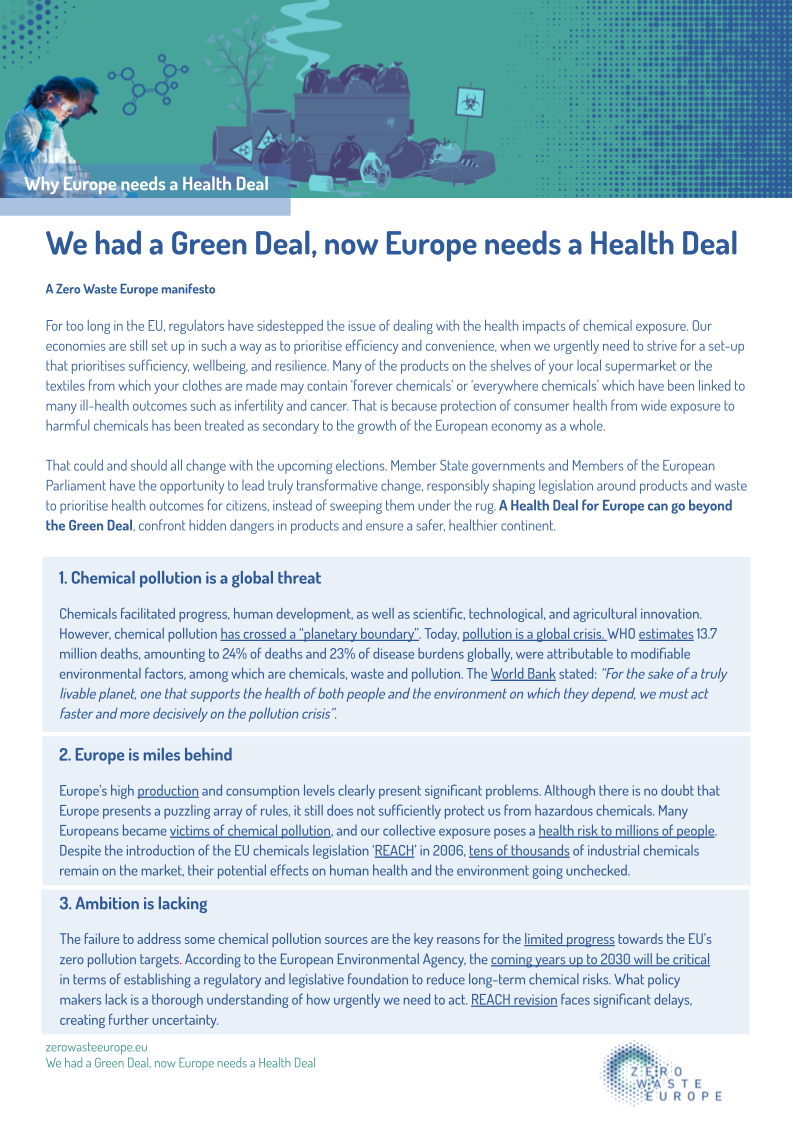
For too long in the EU, regulators have sidestepped the issue of dealing with the health impacts of chemical exposure. Our economies are still set up in such a way as to prioritise efficiency and convenience, when we urgently need to strive for a set-up that prioritises sufficiency, wellbeing, and resilience. Member State governments and Members of the European Parliament have the opportunity to lead truly transformative change, responsibly shaping legislation around products and waste to prioritise health outcomes for citizens, instead of sweeping them under the rug. This is Zero Waste Europe’s manifesto for a health deal for Europe – which goes beyond the Green Deal to confront hidden dangers in products and ensure a safer, healthier continent.
Available in English.
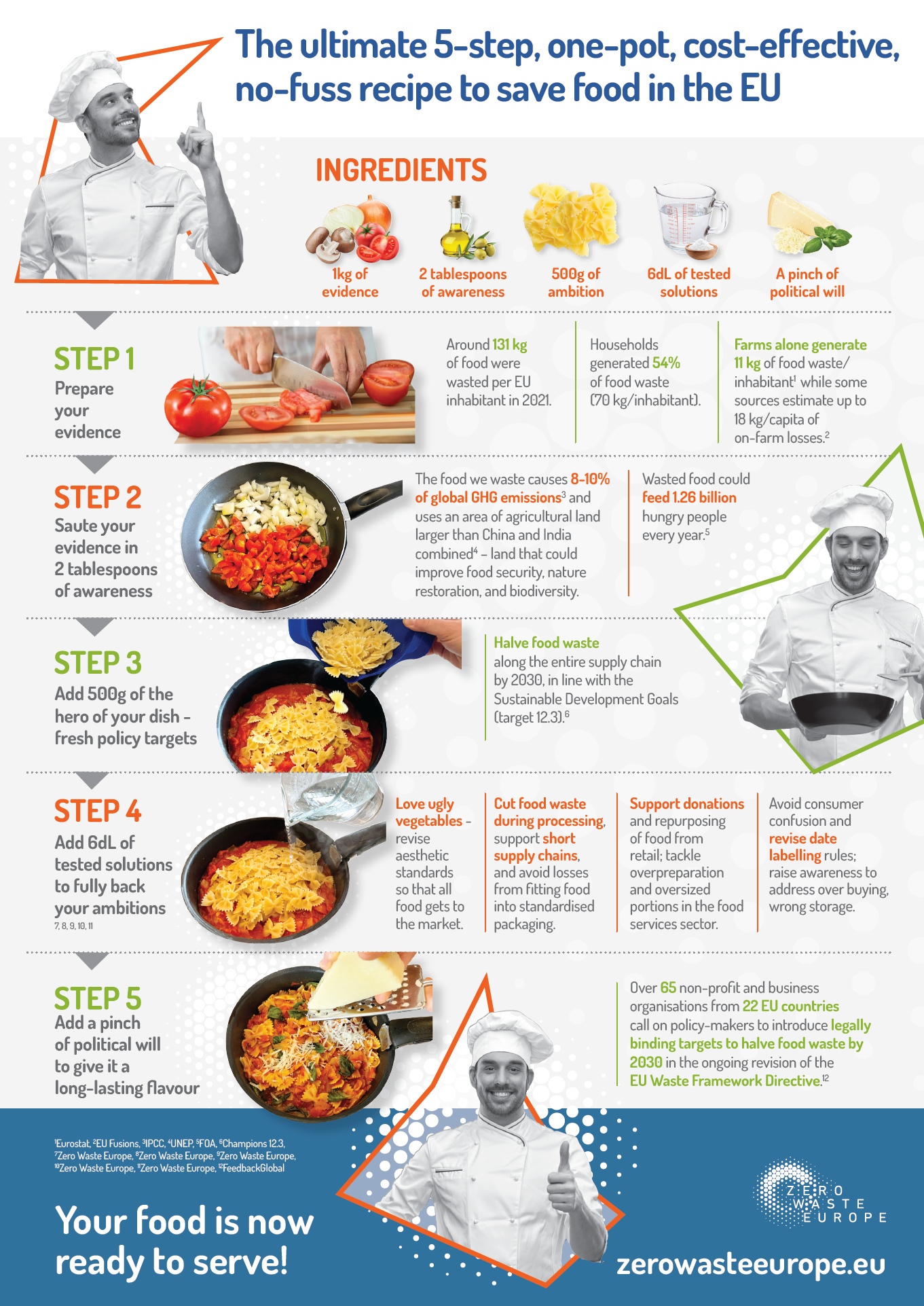
Over 58 million tonnes of food are wasted annually in the EU, with losses happening across the entire supply chain – a waste stream that not only causes between 8-10% of global GHG emissions, but also could be put to much better use on people’s plates.
This infographic makes a compelling case for halving food waste in the EU by 2030, presented as a delicious legislative (and culinary) recipe!
Available in English.
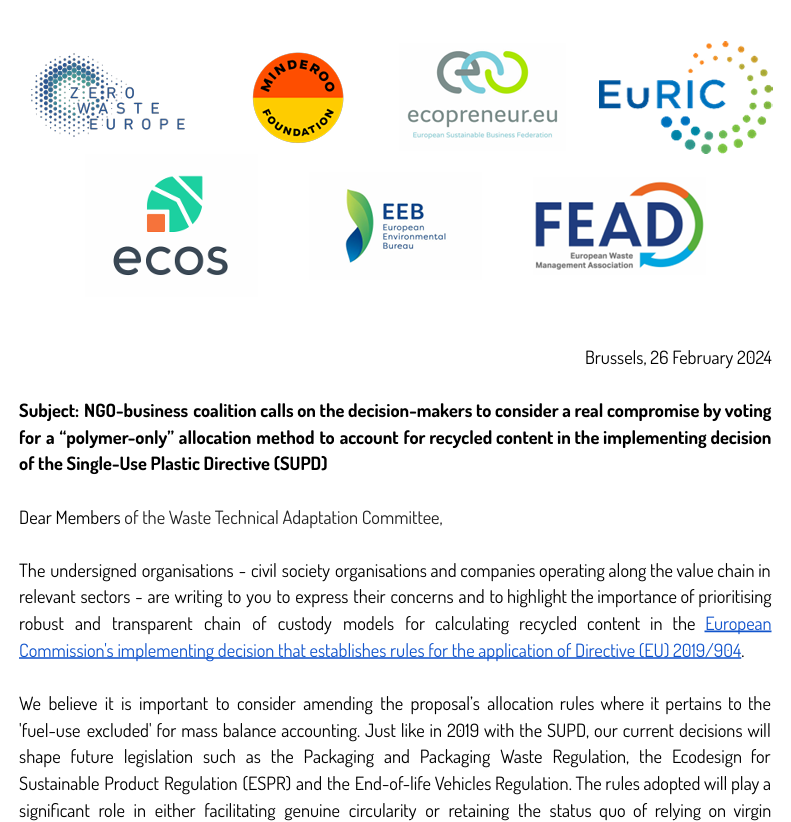
NGOs and businesses have formed a unified voice in this joint letter calling on the decision-makers to consider a real compromise by voting for a “polymer-only” allocation method to account for recycled content in the implementing decision of the Single-Use Plastic Directive (SUPD).
Available in English.
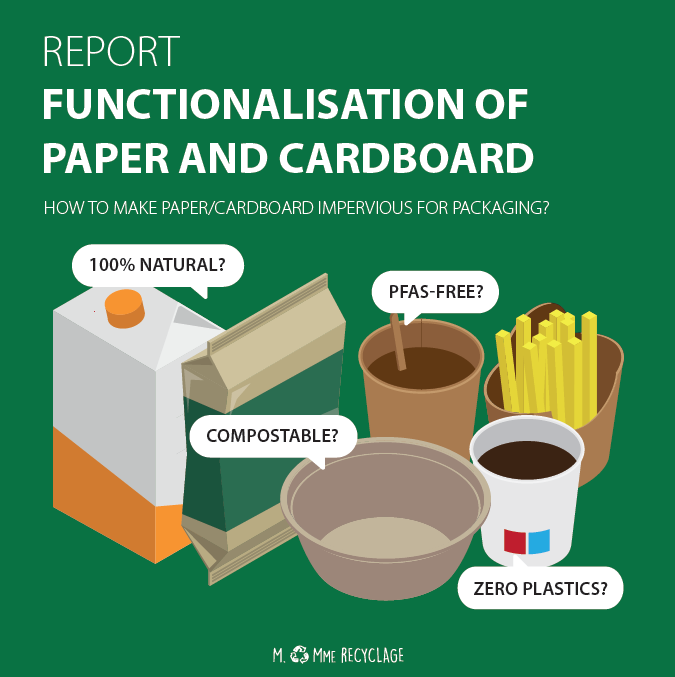
Paper and cardboard require functionalisation so that they can be used in contact with food. Functionalisation may include adding a barrier function to water, grease, gases, etc. This is mainly achieved through the use of plastic, i.e. the combination of polymer(s) + additive(s). Paper and cardboard food packaging are, therefore, not free from plastic. As such, most paper and cardboard packaging remain at the same level as “single-use plastics”, as defined in the European Directive on Single-Use Plastics.
The English version of this report by M. + Mme Recyclage was made possible thanks to the contributions of Ville de Paris, Zero Waste Europe, the Rethink Plastic alliance, and the ReuSe Vanguard Project (RSVP).
Available in English.
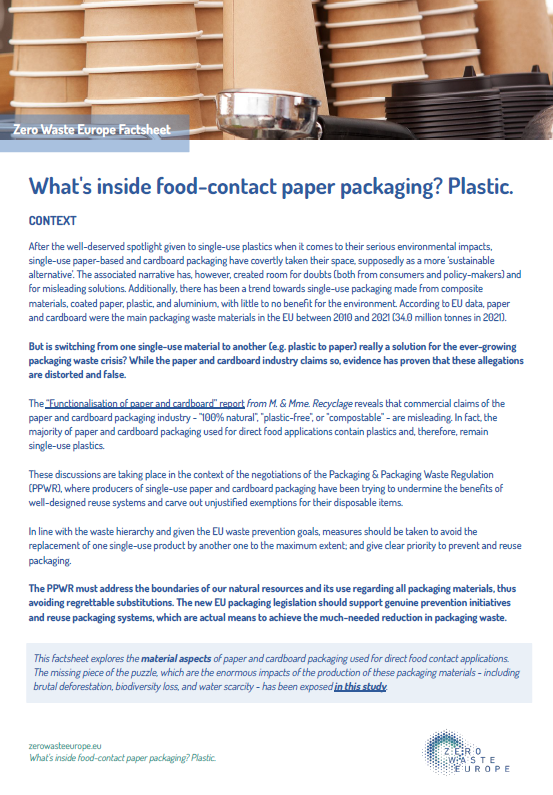
After the well-deserved spotlight given to single-use plastics when it comes to their serious environmental impacts, single-use paper-based and cardboard packaging have covertly taken their space, supposedly as a more ‘sustainable alternative’. The associated narrative has, however, created room for doubts (both from consumers and policy-makers) and for misleading solutions But is switching from one single-use material to another (e.g. plastic to paper) really a solution for the ever-growing packaging waste crisis? While the paper and cardboard industry claims so, evidence has proven that these allegations are distorted and false.
This joint factsheet by Zero Waste Europe, #breakfreefromplastic, Deutsche Umwelthilfe (DUH), the Environmental Paper Network (EPN), Recycling Netwerk Benelux (RNB), and the Rethink Plastic alliance explores the material aspects of paper and cardboard packaging used for direct food contact applications – including, among others, the findings from the “Functionalisation of Paper and Cardboard” report by M.+Me Recyclage.
Available in English, Lithuanian, and Portuguese.
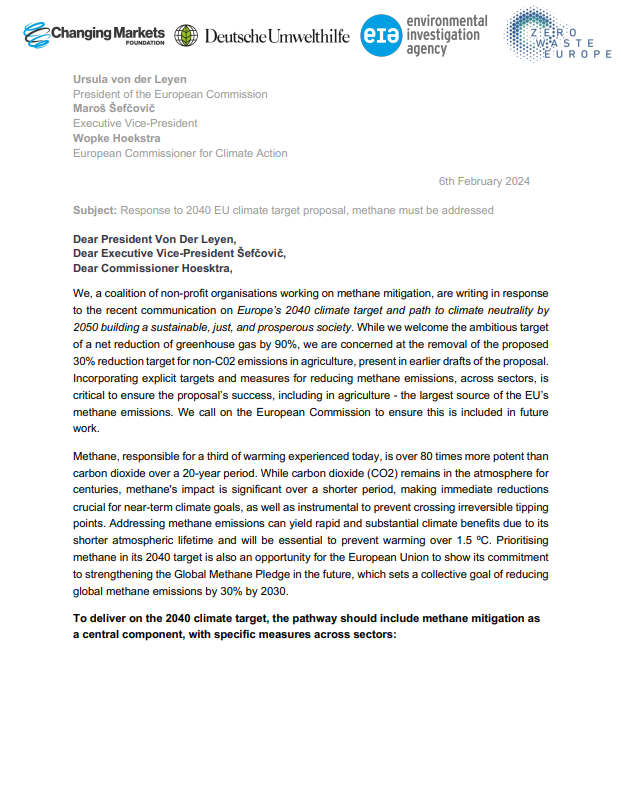
The Methane Matter Coalition, a coalition of non-profit organisations working on methane mitigation, has submitted a collective letter to the European Commission regarding the recently announced 2040 climate target. Enclosed within this letter are our recommendations aimed at significantly reducing methane emissions across various sectors within the EU, namely agriculture, waste management, and energy. These recommendations address key priority areas aligned with the 10 building blocks outlined in the 2040 proposal, emphasizing the importance of effective methane reduction strategies.
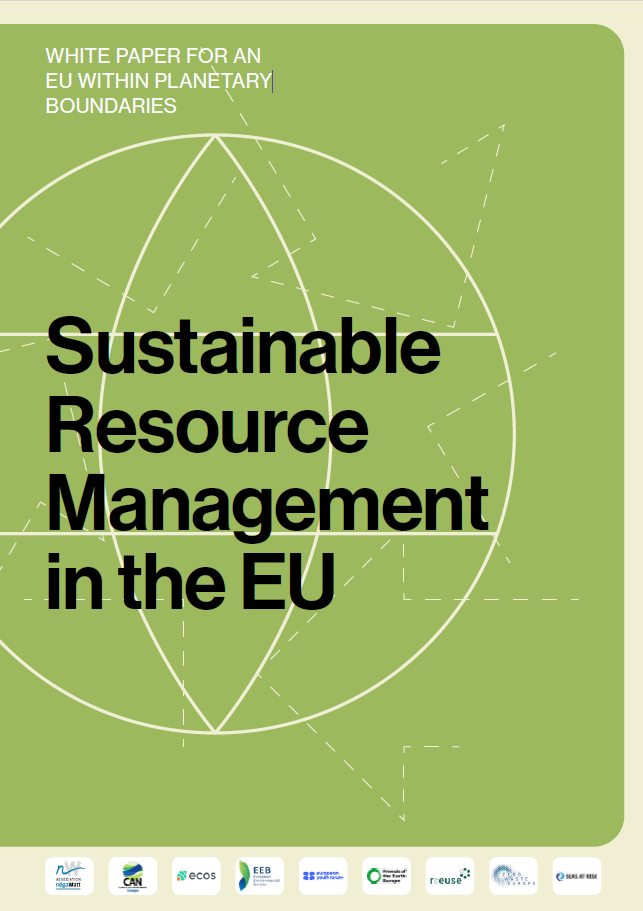
White paper for an EU within planetary boundaries
Resource use is the big blind spot in the EU’s climate policy. 90% of global biodiversity loss and water stress, 50% of global greenhouse gas emissions, and over 30% of air pollution health impacts are caused by resource extraction and processing. We are calling on the EU to introduce a framework on sustainable resource management with science-based binding reduction targets. This policy paper, co-produced with eight other NGOs, outlines policy recommendations and arguments in favour of urgent action.
Available in English.
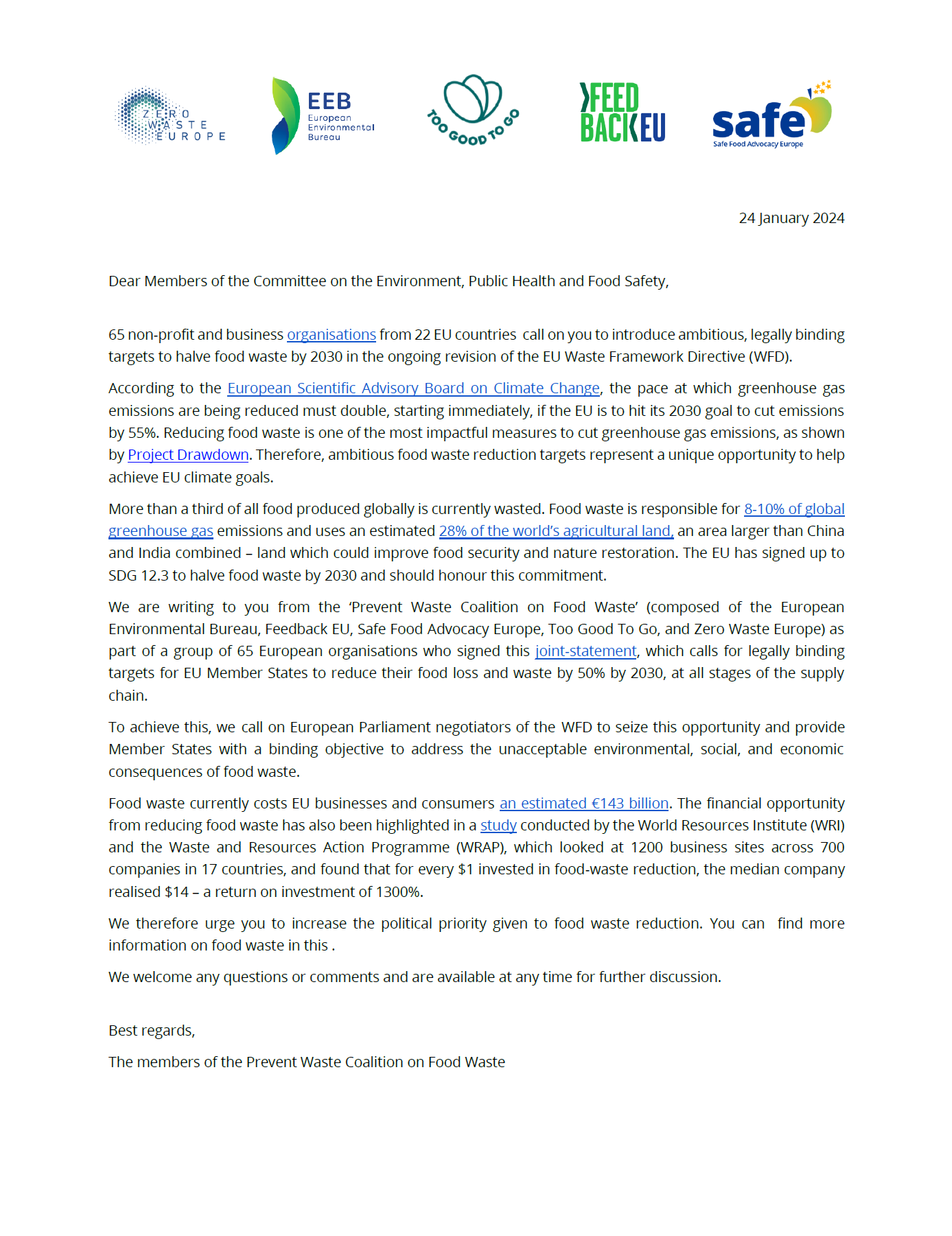
65 non-profit and business organisations from 22 EU countries call on the European Parliament to introduce ambitious, legally binding targets to halve food waste by 2030 in the ongoing revision of the EU Waste Framework Directive (WFD).
Reducing food waste is one of the most impactful measures to cut greenhouse gas emissions. Because of this, ambitious food waste reduction targets represent a unique opportunity to help achieve EU climate goals.
Together with 65 European organisations, the ‘Prevent Waste Coalition on Food Waste’ (composed of the European Environmental Bureau, Feedback EU, Safe Food Advocacy Europe, Too Good To Go, and Zero Waste Europe) is therefore calling for legally binding targets for EU Member States to reduce their food loss and waste by 50% by 2030, at all stages of the supply chain.
Available in English.
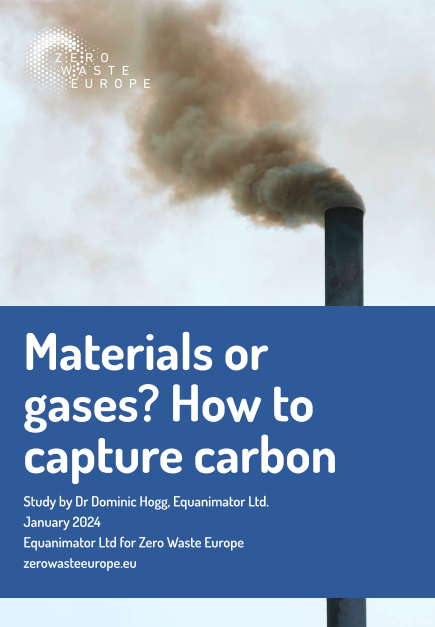
This study explores mixed waste sorting as a cost-effective strategy for substantial reductions in greenhouse gas (GHG) emissions from waste incineration, challenging the viability of Carbon Capture and Storage (CCS). Comparing Leftover Mixed Waste Sorting (LMWS) and CCS, the study suggests LMWS as a swift, economical approach for municipalities and incineration operators to achieve significant GHG reductions, offering flexibility and avoiding excessive costs linked to CCS. The ‘low-regret’ nature of LMWS is highlighted, aiding Member States in meeting recycling and climate targets while reducing incineration capacity.
Available in English.
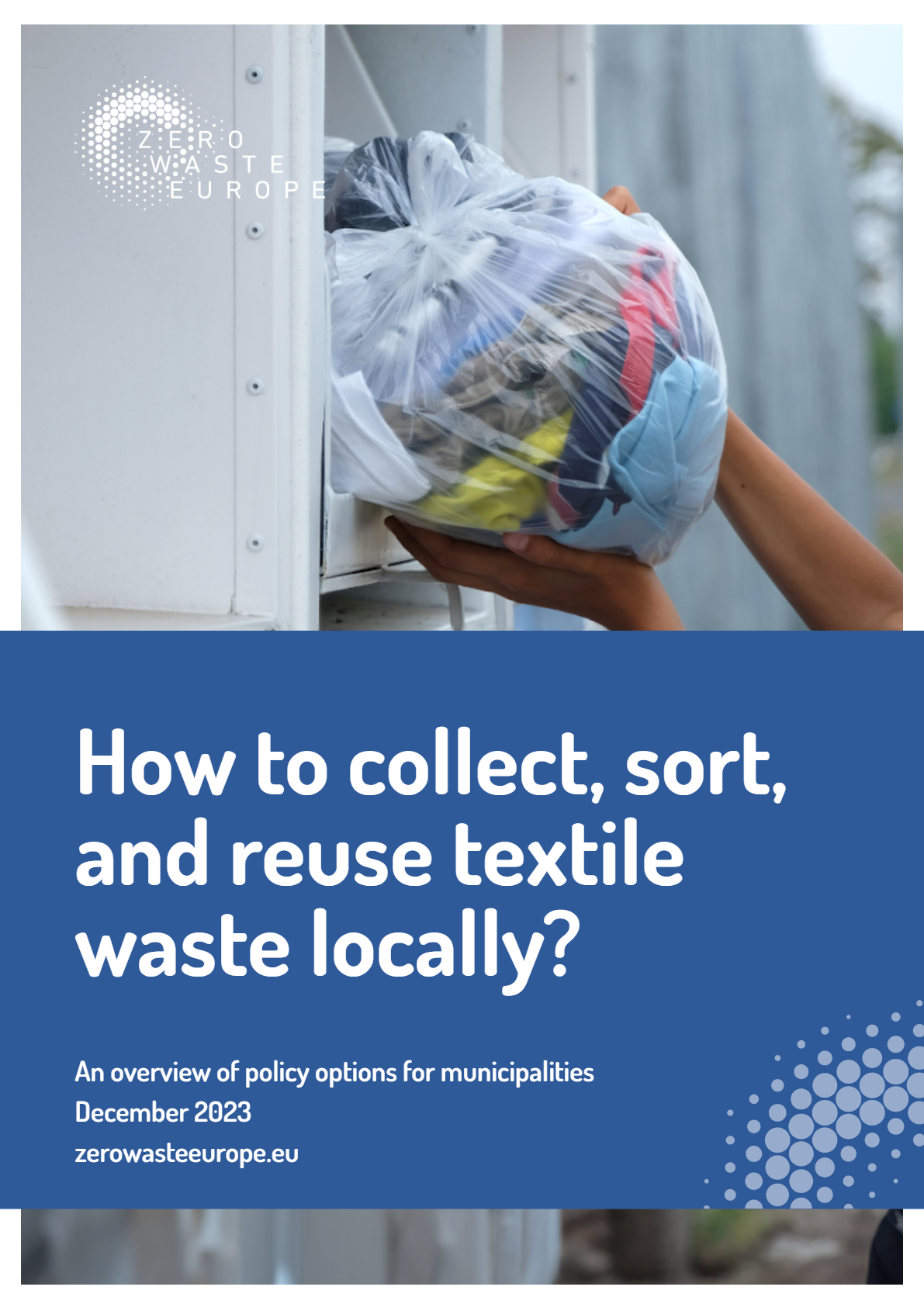
In view of the EU-wide mandatory separate collection of textile waste as of 2025, municipalities have the chance to align textile collection with the waste hierarchy and support a system of local reuse, particularly for clothing. This paper provides municipalities with an overview of good practices and lessons learned from the separate collection of textile waste across Europe.
An optimised collection system can support the implementation of local zero waste solutions. While there is no one-size-fits-all solution, we have identified key success factors, including adopting the collection method to the needs of citizens, mandating quality sorting for reuse, promoting local reuse, and setting up a good governance structure. The governance of the system should seek to integrate the local collection and reuse into the wider policy framework and link social policies with circular economy objectives.
Municipalities hold key levers to steer the system towards local reuse by requiring collectors to generate and report data as well as set performance indicators in line with the waste hierarchy. Finally, the system must anticipate the introduction of the EU-wide introduction of the Extended Producer Responsibility (EPR) scheme for textiles, which is currently being negotiated at the EU level and is likely to become mandatory in all Member States after 2027.
Available in English.
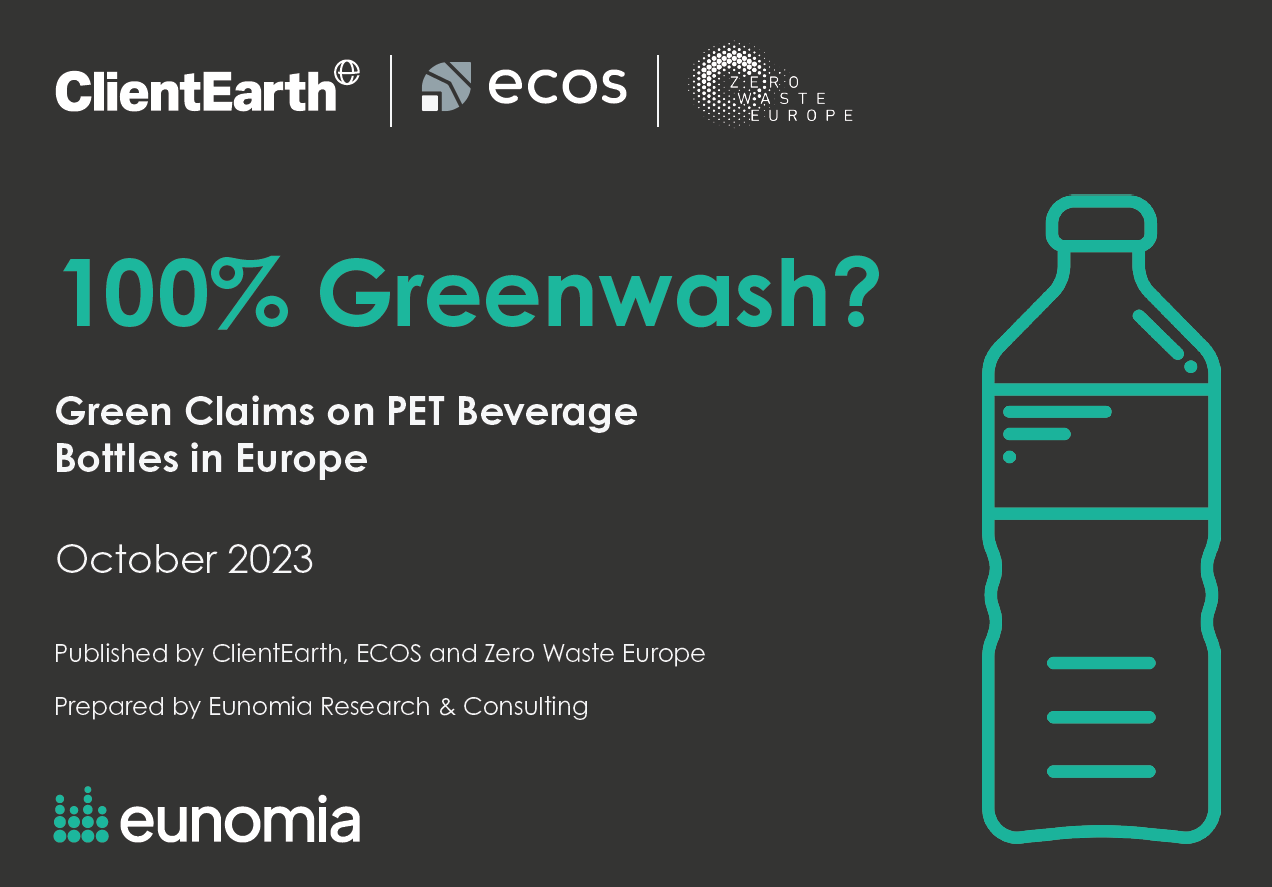
In this report prepared by Eunomia Research & Consulting for ClientEarth, ECOS – Environmental Coalition on Standards, and Zero Waste Europe, we explore the current state of PET-based bottle recycling in Europe, as well as its potential for improvement, alongside analysis of common claims made to consumers on bottle labels relating to recycling. Such claims can give an impression of ‘plastic bottle circularity’ that does not reflect reality.
Available in English.
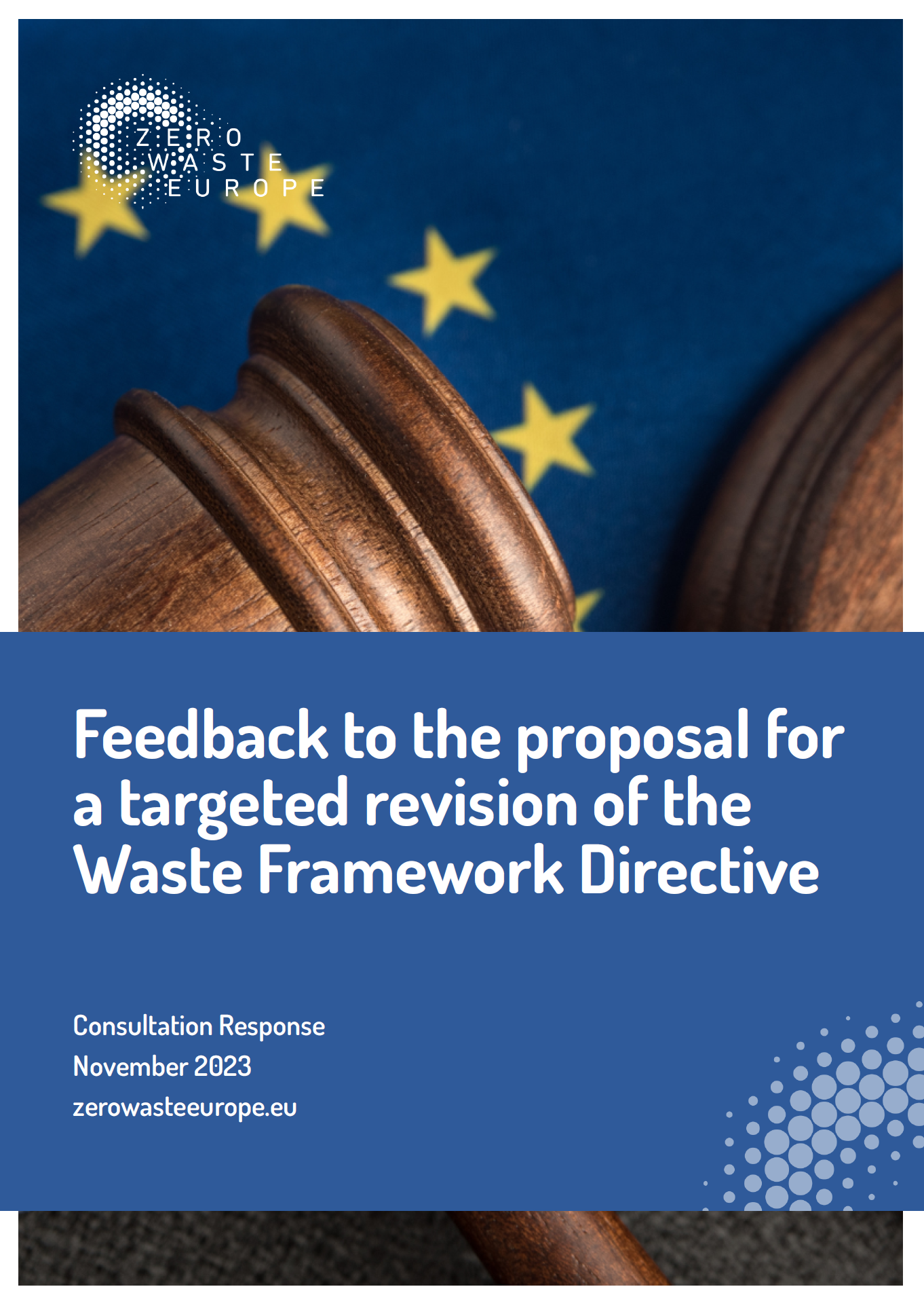
Zero Waste Europe welcomes the proposal for a targeted revision of the Waste Framework Directive, introducing food waste reduction targets and Extended Producer Responsibility (EPR) for textiles. Yet, the proposal falls short of addressing some of the pain points ZWE has raised for year, among which are the lack of action on residual waste generation, the overhaul of the definition of recycling, and targets for bio-waste collection. In the long run, ZWE urges the EU to revise the directive to align with the EU climate targets and introduce a law on resource/material use.
Available in English
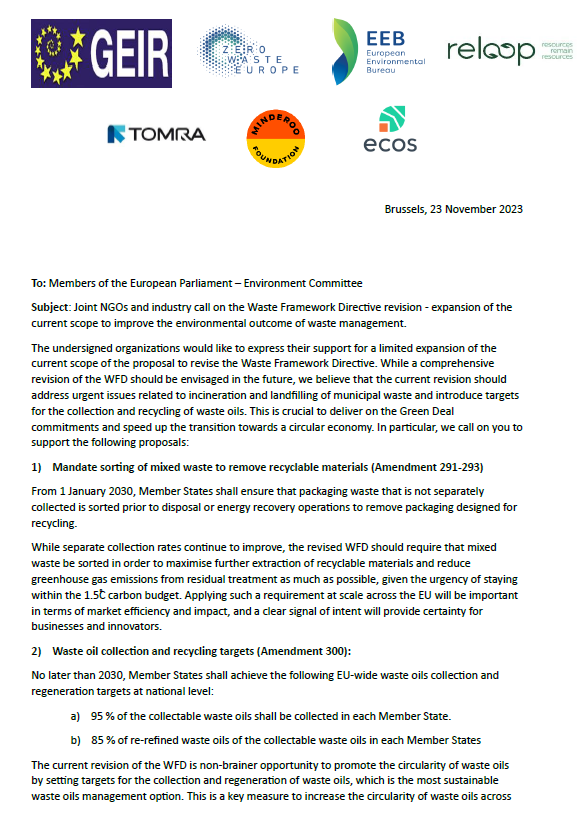
In this joint letter, civil society and industry organisations would like to express their support for a limited expansion of the current scope of the proposal to revise the Waste Framework Directive (WFD).
While a comprehensive revision of the WFD should be envisaged in the future, the current revision should address urgent issues related to incineration and landfilling of municipal waste and introduce targets for the collection and recycling of waste oils. This is crucial to deliver on the Green Deal commitments and speed up the transition towards a circular economy.
Available in English.
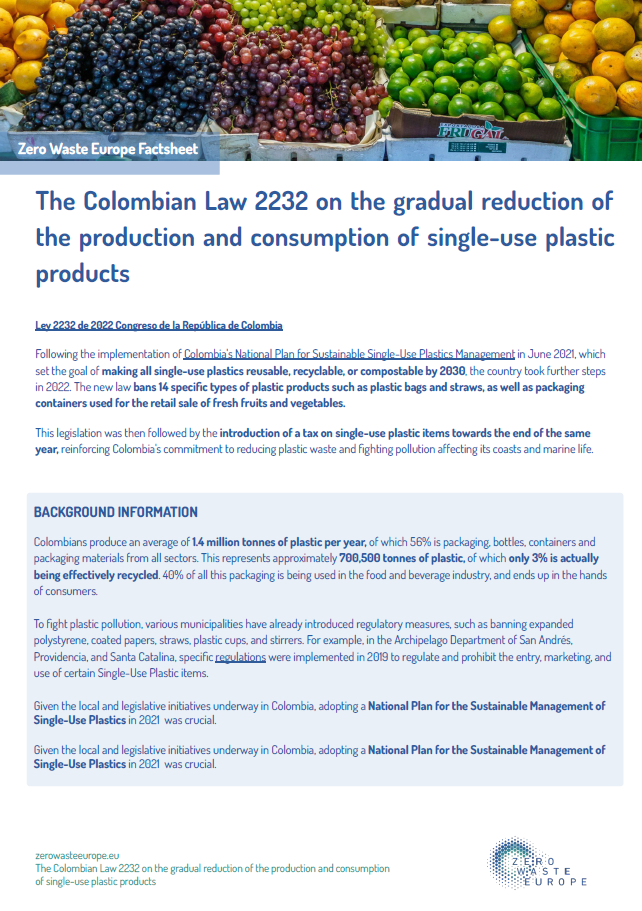
In 2022, Colombia took further steps to strengthen the implementation of its National Plan for Sustainable Single-Use Plastics Management. The country has set the goal of making all single-use plastics reusable, recyclable, or compostable by 2030.
As part of our activities for the 2023 European Week of Waste Reduction, this factsheet analyses Colombia’s Law 2232 on the gradual reduction of the production and consumption of single-use plastic products. The new law bans 14 specific types of plastic products such as plastic bags and straws, as well as packaging containers used for the retail sale of fresh fruits and vegetables.
Available in English.
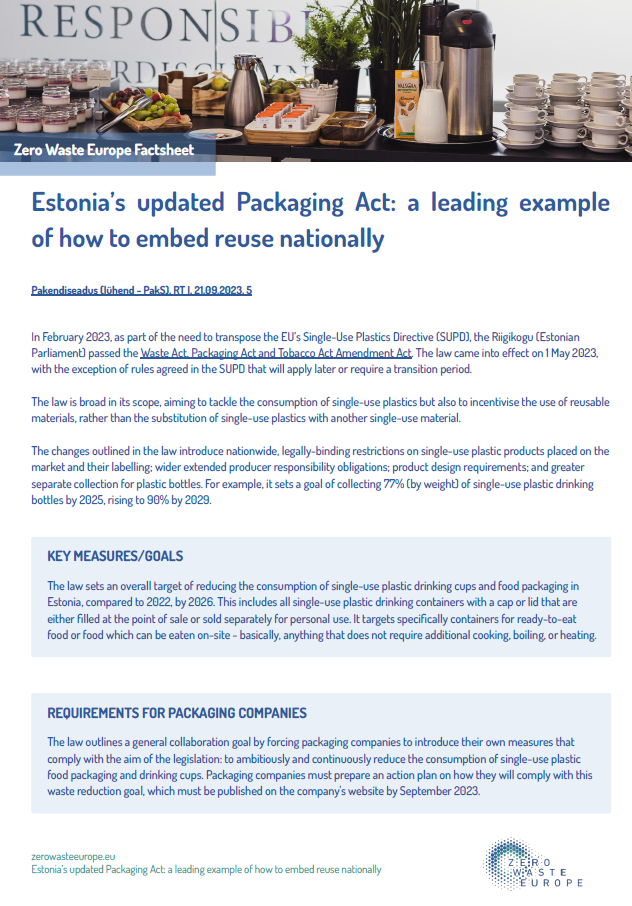
In February 2023, as part of the need to transpose the EU’s Single-Use Plastics Directive (SUPD), the Riigikogu (Estonian Parliament) passed the Waste Act, Packaging Act and Tobacco Act Amendment Act. The law came into effect on 1 May 2023, with the exception of rules agreed in the SUPD that will apply later or require a transition period.
As part of our activities for the 2023 European Week of Waste Reduction, this factsheet lays out Estonia’s measures to implement the SUPD nationally – from binding actions for packaging companies to mandatory reuse items in public events.
Available in English.

















